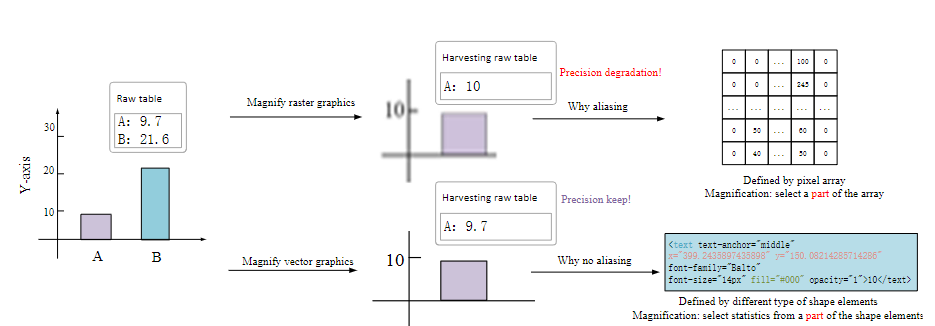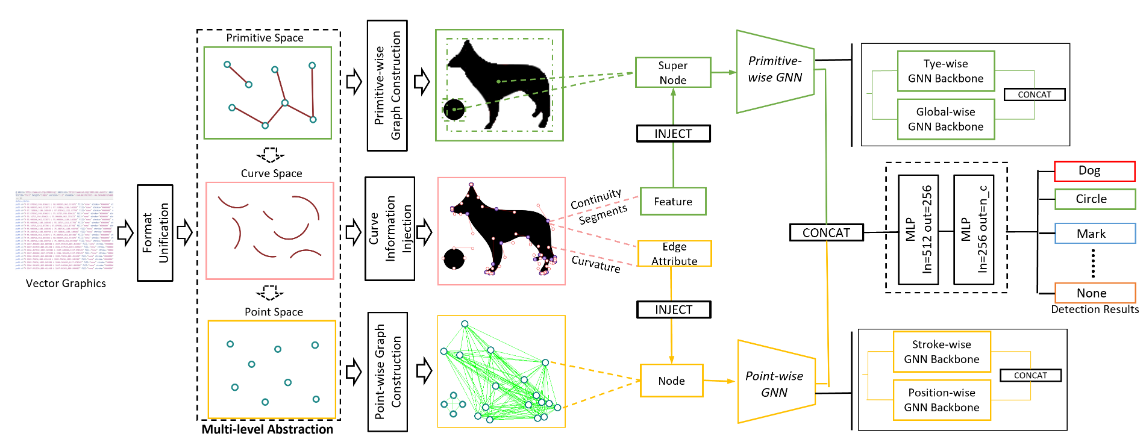|
|
||
|---|---|---|
| .github/workflows | ||
| Datasets | ||
| cad_recognition | ||
| data | ||
| gcn_lib | ||
| misc | ||
| utils | ||
| .gitignore | ||
| CODE_OF_CONDUCT.md | ||
| LICENSE | ||
| NOTICE | ||
| README.md | ||
| SECURITY.md | ||
| SUPPORT.md | ||
| deepgcn_env_install.sh | ||
README.md
🔥 [NIPS2021, TPAMI2024] YOLaT & YOLaT++: Powerful and Efficient Graph Models for Vector Graphics Recognition
📜 Introduction
This repository is the official PyTorch implementation of our two powerful vector graphics recognition models.
NeurIPS-2021 paper: Recognizing Vector Graphics without Rasterization.
TPAMI-2024 paper: Hierarchical Recognizing Vector Graphics and A New Chart-based Vector Graphics Dataset

Rendering vector graphics into pixel arrays can result in significant memory costs or loss of information, as demonstrated in above Figure 1. Additionally, this process discards high-level structural information within the primitives, which is critical for recognition tasks such as identifying corners and contours. To summarize, we propose You Only Look at Text series (YOLaT & YOLaT++) which addresses issues with raster graphics by taking in textual documents of vector graphics as input.
Environments
conda create -n your_env_name python=3.8
conda activate your_env_name
sh deepgcn_env_install.sh
YOLaT
1. Data Preparation
Floorplans
a) Download and unzip the Floorplans dataset to the dataset folder: data/FloorPlansGraph5_iter
b) Run the following scripts to prepare the dataset for training/inference.
cd utils
python svg_utils/build_graph_bbox.py
Diagrams
a) Download and unzip the Diagrams dataset to the dataset folder: data/diagrams
b) Run the following scripts to prepare the dataset for training/inference.
cd utils
python svg_utils/build_graph_bbox_diagram.py
2. Training & Inference
Floorplans
cd cad_recognition
CUDA_VISIBLE_DEVICES=0 python -u train.py --batch_size 4 --data_dir data/FloorPlansGraph5_iter --phase train --lr 2.5e-4 --lr_adjust_freq 9999999999999999999999999999999999999 --in_channels 5 --n_blocks 2 --n_blocks_out 2 --arch centernet3cc_rpn_gp_iter2 --graph bezier_cc_bb_iter --data_aug true --weight_decay 1e-5 --postname run182_2 --dropout 0.0 --do_mixup 0 --bbox_sampling_step 10
Diagrams
cd cad_recognition
CUDA_VISIBLE_DEVICES=0 python -u train.py --batch_size 4 --data_dir data/diagrams --phase train --lr 2.5e-4 --lr_adjust_freq 9999999999999999999999999999999999999 --in_channels 5 --n_blocks 2 --n_blocks_out 2 --arch centernet3cc_rpn_gp_iter2 --graph bezier_cc_bb_iter --data_aug true --weight_decay 1e-5 --postname run182_2 --dropout 0.0 --do_mixup 0 --bbox_sampling_step 5
YOLaT++

YOLaT++ is introduced, characterized by a hierarchical structure designed for VGs, spanning three levels: Primitive, Curve, and Point. Additionally, YOLaT++ employs a position-aware enhancement strategy to effectively differentiate similar primitives.
Citation
BibTex:
@inproceedings{jiang2021recognizing,
title={{Recognizing Vector Graphics without Rasterization}},
author={Jiang, Xinyang and Liu, Lu and Shan, Caihua and Shen, Yifei and Dong, Xuanyi and Li, Dongsheng},
booktitle={Proceedings of Advances in Neural Information Processing Systems (NIPS)},
volume={34},
number={},
pages={},
year={2021}}
@inproceedings{yolat24,
title={{Hierarchical Recognizing Vector Graphics and A New Chart-based Vector Graphics Dataset}},
author={Shuguang Dou, Xinyang Jiang, Lu Liu, Lu Ying, Caihua Shan, Yifei Shen, Xuanyi Dong, Yun Wang, Dongsheng Li, Cairong Zhao},
booktitle={IEEE Transactions on Pattern Analysis and Machine Intelligence},
volume={},
number={},
pages={},
year={2024}}
Please do consider 🌟 star our project to share with your community if you find this repository helpful!
